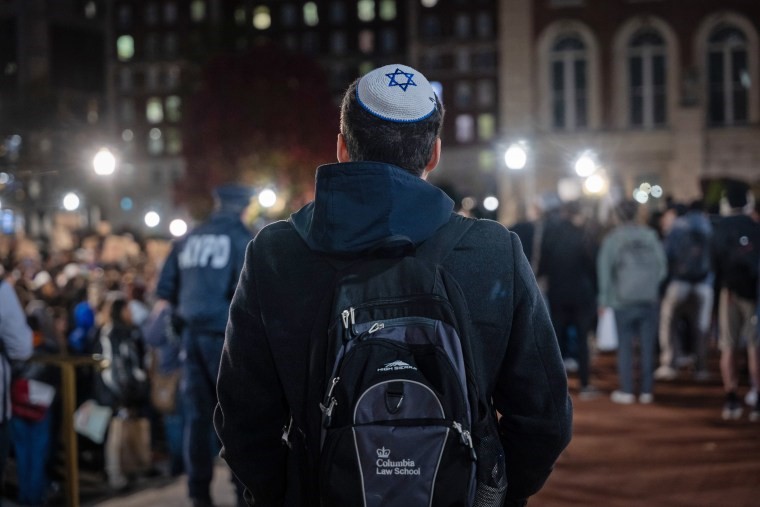
In late April and early May 2024, anti-Israel college campus protests across the country deteriorated into pro-Hamas, pro-terror encampments from which the most vile antisemitic rhetoric arose. Chants of “We are Hamas,” “Intifada Revolution,” and “Jews go back to Poland” were standard fare at elite universities like Columbia, Yale, Northwestern, and UCLA. Jewish students were screamed at, barred from certain areas of campuses, and scared to even walk to class. The language and ideology that we’re seeing weaponized today has left not just Jewish students, but Jews everywhere, profoundly rattled.
These events are a natural escalation from what the Jewish community has been seeing since October 7th. Before Israel had even launched a counterattack following the brutal massacre of 1,200 Israelis and kidnapping of 250 more by Hamas, anti-Israel protestors called these actions justified resistance against the Israeli “occupation” and put the blame for such atrocities on Israel. This rhetoric shocked many American Jews. But for those paying attention, this too was a natural escalation from a deeply flawed leftist ideological framework that has been allowed to creep from academia into the workplace and our institutions over the last several years.
Adam Milstein, an American from Israeli descent “venture philanthropist” who is highly active in the Los Angeles, American, and global Jewish philanthropy communities, has been paying very close attention. In an article for The Jerusalem Post, he makes an argument that Diversity, Equity, and Inclusion (DEI) measures, part and parcel of this progressive framework, have been used to marginalize Jews on campus, in government, and in the corporate world.
Thanks to his vast experience, Milstein is deeply familiar with the dangerous ideological threads that inform left-wing antisemitism. After moving to the U.S. and making his mark in the commercial real estate world, he and his wife Gila founded the Adam and Gila Milstein Family Foundation, which is committed to strengthening American values, supporting the U.S.-Israel alliance, and combating bigotry and hatred in all forms They are dedicated to safeguarding Israel and America’s shared values—freedom, human rights, and democracy—and strive to work to eradicate the common enemies who threaten these values.
MFF builds coalitions that provide Americans with facts and knowledge to advocate and take effective action against radical movements that spread hate, bigotry, and discrimination.So why is the DEI framework such a problem on campus and beyond? Milstein reports that its purported goals are in fact noble: “to promote the representation, participation, and fair treatment of historically marginalized group.” But when put into practice, DEI measures tend to enforce an orthodoxy of thought that “require[s] its adherents to follow its tenets blindly without doubt or reservation.” By “promoting equality of outcome over equality of opportunity, collective identity (race, gender, etc.) over individual character, censorship of opposing viewpoints over freedom of speech, and a victim culture that crudely bifurcates society into oppressors and oppressed,” DEI inherently marginalizes Jews. They are categorized as white and privileged, regardless of the fact that many do not identify as white and have no greater privilege than their peers, and are therefore deemed unworthy of protection from a discrimination that DEI does not even recognize as such.
Milstein quotes Kenneth Marcus, Founder and Chairman of the Brandeis Center for the Protection of Human Rights Under Law: “‘[I]n the DEI programs, we’re seeing anti-Jewish stereotypes, biases, defamations, separation of Jews from other groups, and so-called ‘erasive antisemitism,’ which is to say denial of what it means to have a Jewish identity.” This erasive antisemitism is dangerous because it erases the Jewish experience entirely. Jews are a people who were constantly exiled from our native homeland and “who against all odds persistently maintained our own unique Jewish Civilization through two thousand years of statelessness.” Through it all, we maintained a “devout desire to restore our ancient nation in the Land of Israel.” Unfortunately, this experience – long, bloody, and incredibly well-documented in our religious and intellectual works – is written off by DEI adherents.
This is an acute problem for Jewish students in universities that employ dozens of administrators whose job it is to protect them. Tabia Lee, a former DEI department head at Silicon Valley’s De Anza College, detailed the toxicity on her campus in a New York Post article. When Jewish students told her they were enduring antisemitism, she set up events with Jewish speakers to promote diversity. But she was told by colleagues that she “shouldn’t raise issues about Jewish inclusion or antisemitism. I was told in no uncertain terms that Jews are ‘white oppressors’ and our job as faculty and staff members was to ‘decenter whiteness.’” She was eventually fired, and she suspects her “defense of Jewish students played a part.”
Since then, she says, “[c]ountless faculty and students on campuses nationwide have told me the DEI ideology encourages antisemitism. One study found 96% of Israel-focused tweets by campus DEI staff criticized the Jewish state.” Milstein cites this same study, which was done by The Heritage Foundation. It concludes that “DEI staff have an obsessive and irrational animus toward the Jewish state.” It’s hard to disagree with Milstein’s point that “[w]hen DEI staff and administration hold clear animus and bias against the world’s only Jewish state, universities are implicitly and unfairly discriminating against Jewish students.”
It’s unconscionable that Jewish students not only have to navigate the blatantly antisemitic rhetoric from their fellow students and their professors, but also suffer a complete lack of concern and action from DEI administrators who are paid astronomical salaries to cultivate a safe, inclusive environment for all. “The average university now employs roughly 45 DEI staffers,” says Milstein. “These small armies rarely celebrate Jewish identity or work towards our inclusion; far more often, they exclude and marginalize Jews on campus.” They refuse to engage with the Jewish experience and thus “inculcate[e] ideas about our community that are very different from the principles that our faith embodies, and the United States purports to champion.”
Milstein cautions against continuing to let flawed progressive frameworks like DEI seep into our culture. He argues that “[i]f American institutions continue to adopt and reflect extreme DEI ideologies, Jews will suffer.” His words teach us that in order for Jews to be able to live proudly in their Jewish identity, everyone, Jews and non-Jews alike, must stand up to those who seek to force people into categories that do not represent them. Because as the late Rabbi Jonathan Sacks said so presciently, “[T]he hate that begins with Jews never ends with Jews.”












